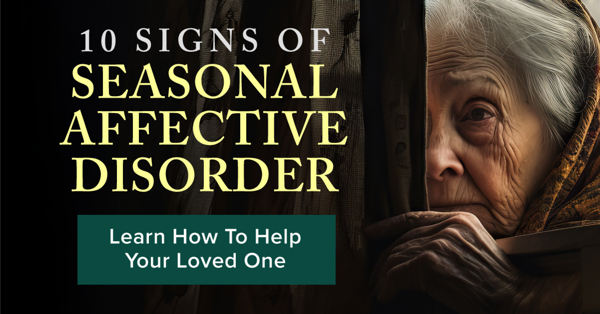Your dad is sleeping more than usual.
Your mom has lost interest in Bingo and other activities she used to love.
Is it just the winter blues or could it be something more serious?
“The winter months can be hard for seniors. The days are cold and gray and, if there’s snow or ice on the ground, it’s hard for them to get out and about – especially if there are mobility issues,” said Sierra Goetz, operations director at Trail Ridge Home Care’s partner, the HomeCare Advocacy Network (HCAN). “While quick bouts of the winter blues are common, it’s important to watch for signs that it could be something more serious.”
According to experts at Johns Hopkins Medicine, Seasonal Affective Disorder (SAD) is a form of depression that sets in or gets worse during the winter. Experts believe that shorter days and less daylight may trigger a chemical change in the brain leading to the following symptoms of depression:
- Increased sleep and daytime drowsiness
- Loss of interest and pleasure in activities formerly enjoyed
- Social withdrawal and increased sensitivity to rejection
- Feelings of guilt and hopelessness
- Fatigue and low energy level
- Decreased ability to focus or concentrate
- Increased appetite – especially for sweets and carbohydrates
- Weight gain
- Physical problems, such as headaches
- Irritability and anxiety
If you’re worried that your aging loved ones have more than a mild case of the winter blues, seek advice from their physician. To help reduce the risk of SAD, experts suggest you help your loved ones:
Make their environment sunnier and brighter. Open blinds and trim tree branches that block windows.
Get outside. If it’s not too cold, icy or snowy, take them for walks or simply sit outside and soak up the sun.
Exercise regularly. Physical exercise helps relieve stress and anxiety, both of which can increase symptoms.
Normalize sleep patterns. Schedule reliable times to wake up and go to bed each day to reduce or eliminate napping and oversleeping.
“We understand that you can’t be with your aging loved ones all the time – especially if you live hours away,” Goetz said. “No one can replace family, but our caregivers can provide much needed companionship during the winter months and beyond. You’ll have peace of mind knowing your loved one isn’t lonely, and we’ll let you know if we’re seeing signs that your senior has more than the winter blues”
For more information about Trail Ridge Home Care’s services and customized care plans, visit TrailRidgeHomeCare.com.
